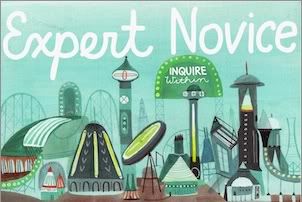I am inclined to believe them. Because the magicians? They were really pretty great.
I talk about this paper quite a bit; it's one of the many far-fetched projects I can't believe I've been lucky enough to work on here at Harvard. There I was, a first-semester freshman, and one Professor John Stilgoe was kind enough to accept my audacious claim that I would learn everything about amateur magicians and their networks of information exchange at the turn of the twentieth century.

I did not learn everything.
But I did learn a surprising amount, huddled in the Harvard Theatre Collection with yellowing magazines arrayed before me. And as I was thinking about what new Internet trend I could gossip about today, I realized that magicians' magazines have taught me at least as much as BoingBoing has about shared interest networks and the passions that make communities come alive.
It's true. This, too, is far-fetched. Far-fetched ideas, though, are occasionally useful! In the process of going far to fetch them, you are likely to encounter something interesting along the way, right? And so, I give to you: amateur magicians, in the form of a brief and, I hope, somewhat tantalizing excerpt.
...The driving force behind the magical craze [at the turn of the twentieth century] was not a polite and appreciative general public, but a throng of fanatically ambitious males. For these men, magical performances were to their ambition what girly shows were to their libido: tantalizing visions of what would be attainable if only one knew how to go about attaining it. [The famous magician] Herrmann’s biography noted that the successful magician at the turn of the twentieth century was “applauded for his deftness, for his ingenuity, for his scientific attainments and his general cleverness, and he becomes famous just as the successful physician, the able lawyer, the brilliant writer, the clear statesman, the bright inventor, and all others who attain high places in any respectable and helpful calling.” The magician’s apparent cleverness and ingenuity – absolute prerequisites for success in any realm of male achievement – were what left his ambitious male audience starstruck and wanting more.
As demand for magicians’ acts increased, fueled by the attentions of these spellbound men, the diffuse coterie of isolated magicians began to realize that they might benefit from commiserating and exchanging knowledge with other like-minded people. However, since the magicians were linked not by locality but by an eccentric and highly individual profession, a traditional club complete with meetings and refreshments would have been an ineffective initial organizing device. Instead, a niche publication emerged onto the scene. Entitled The Sphinx: A Monthly Illustrated Magazine Devoted Exclusively to Magic and Magicians, it served as a structuring mechanism for the burgeoning ranks of magicians. It was a monthly periodical, yes, but it was also the de facto clearinghouse for all information regarding magicians; in effect, it created the magical community. This structure, in organizing professionals, also built the bodies of knowledge, resources, and connections necessary to attract and absorb what turned out to be the most lucrative group of all to the magical industry: the wealthy, would-be amateurs for whom magic was a fantasy hobby.
Amateur magicians poured their energy – and money – into this fantasy hobby because it offered them everything their humdrum careers did not: novelty, power, and the instructions for success. The democratization of magical knowledge through The Sphinx, the magnanimity of its dissemination by the postal service, made parlor magic an even more popular pursuit for the particularly industrious man. In place of a secret society, it created a society of secrets; in place of an impenetrable hierarchy of the elite, it built an accessible meritocracy...
And it goes on. And on. If you are of the two-l school of magical greatness, you should write to me! And I will send you the rest, and we can talk about how truly marvellous all those magicians really were.
Maybe next week I will talk about my research on fallout shelters and consumerism! I've got a huge collection of crazy history papers, kids, and it's not getting any smaller. Brace yourselves, is all I'm saying.



No comments:
Post a Comment